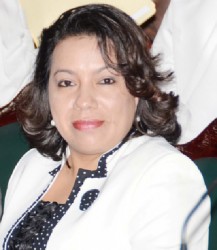Guyana yesterday sharply rebuffed concerns raised by Venezuela in the wake of a US company drilling for oil here and reiterated that it was studying options under the Geneva Agreement to bring the longstanding territorial controversy with Caracas to an end.
In a statement, dated March 3rd and published as an advertisement in the Kaieteur News yesterday, Caracas denied that Venezuela had sought to stymie the development of Guyana and said that Georgetown’s statements to this effect are “unacceptable and unjust.” Caracas also called for national unity of all Venezuelans to “defend the territorial integrity” of Venezuela.
Guyana’s Ministry of Foreign Affairs –Takuba Lodge – in a statement last evening rejected the insinuation that Guyana’s investment operations are or could be inimical to the interests of Venezuela and blasted Caracas for “spurious” claims over the territorial controversy and for seeking to derail projects here.

“Guyana notes that this assertion is without foundation since the Venezuelan Government has also sought to derail other projects in Guyana that are being supported by a mutually friendly State that is fully a part of the ‘unity of Latin America,’” the statement said.
The latest flare-up began last month. On February 28, the Ministry of Foreign Affairs here announced that it had written to its counterpart in Venezuela urging that Caracas desist from actions that could contravene international law and prevent development. According to a statement from the ministry, Venezuelan Foreign Minister Delcy Rodríguez sent communication to the Country Manager of Esso Exploration and Produc-tion Guyana Limited, objecting to the dispatch of a rig to proceed with the exploration of an oil well in the concession granted by the Government of Guyana.
The Government of Guyana subsequently dispatched a Note Verbale to the Venezuelan Foreign Ministry. “The Ministry of Foreign Affairs has re-quested that the Govern-ment of the Bolivarian Republic of Venezuela desist from taking any actions that could only result in the stymieing of the development of Guyana and its people and that would be in contravention of international law,” it said. Guyana had also informed Caricom, UNASUR, the Organisation of American States, the Commonwealth as well as the United Nations Secretary General about the action by Venezuela.
Surprised

In the statement yesterday, Caracas said that it is “surprised by the false accusation” that Venezuela seeks or has sought to stymie the development of Guyana when “reliable proof” can be displayed that the governments of the late president Hugo Chavez and President Nicolas Maduro as well as their Guyanese counterparts have maintained their conviction of the necessity of deepening bilateral cooperation “as an essential part of the mechanism [to] facilitate the resolution of the dispute inherited from British colonialism.” In this regard, the statement cited the PetroCaribe energy accord under which Guyana benefits from concessional oil and the bartering of rice.
Takuba Lodge, however, noting that the Venezuelan communiqué mentions the fact that leaders from both countries have underscored the “necessity of deepening cooperation” between Guyana and Venezuela, said that Caracas fails to recognize that those efforts have been defeated by Venezuela’s threats and actions against investors wishing to operate and those already operating in Guyana, including by the very Communiqué under reference.
“The premise of Venezuela’s objections continues to be its spurious and illegal claim to Guyana’s territory. The land boundary between Guyana and Venezuela was permanently and definitively delimited on October 3, 1899 pursuant to the Treaty of Washington of February 2, 1897. The view expressed in the Communiqué under reference that there is a territorial dispute “inherited from British colonialism” is therefore patently false,” Takuba Lodge declared.
The Caracas statement also said that the Venezuelan government “deplores” the reaction of the Guyana government to the Venezuelan assertion against the unilateral acts that signify the start of exploratory activities by Exxon Mobil and its subsidiary Esso Exploration and Production Guyana Limited in the ‘Stabroek Block’ without the occurrence of prior notification to Caracas, due to the fact that the specific area of operations in the Stabroek Block is defined as a maritime area in the process of delimitation “that corresponds to the claim of territorial sovereignty by Venezuela, within the Geneva Accord.”
Unfettered
Takuba Lodge, however, said that as a sovereign State, empowered under international law to exercise sovereign rights over its continental shelf and exclusive economic zone, Guyana has full and unfettered authority to unilaterally explore – with or without partners – and exploit the living and non-living resources within its jurisdiction. “Any act or objection to the exercise of such jurisdiction is contrary to international law – both codified and customary international law,” it declared.
Further, the Foreign Affairs Ministry said that while it is a fact that the delimitation of the maritime boundary between Guyana and Venezuela remains an outstanding matter, it is pellucid that there are maritime spaces that can legitimately belong to only one of the two States.
“That is fully recognized under both customary and codified international law. Venezuela’s vain effort to link its spurious and illegal claim to Guyana’s Essequibo to matters related to the continental shelf and the exclusive economic zone of Guyana within the context of the Geneva Agreement of February 17, 1966 therefore has no legal basis. The fact is that the Geneva Agreement does not relate to a boundary or territorial dispute, but to a unilateral and unsubstantiated claim by Venezuela that the Arbitral Award of 1899 is null and void. Guyana completely rejects this effort to conflate two separate matters within the context of the Geneva Agreement,” Takuba Lodge declared.
The Venezuelan government also again called on Georgetown to restore as soon as possible, “without reservation or equivocation, the peaceful, legitimate and legal mechanism of the Good Offices of the Secretary General of the United Nations as an optimal and convenient methodology to assume bilateral and amicable…negotiations in order to achieve a practical and satisfactory solution for both sides.”
Elaborated
In response, Takuba Lodge noted that Minister of Foreign Affairs Carolyn Rodrigues-Birkett earlier this year elaborated on the reasons why Guyana was in the process of reviewing the options under the Geneva Agreement for bringing the controversy initiated and maintained by Venezuela, to an end. “It should suffice to repeat that the Good Offices Process has been in existence for over twenty-five years, but Venezuela has on many occasions taken actions and issued statements that are inimical to that process even while it was in full operation – this includes both military actions and strident statements by high officials of Venezuela,” the ministry said.
Caracas also said that it “reserves the right to execute all actions in the diplomatic field and in accordance with international law that might be necessary to defend and safeguard the sovereignty and independence” of Venezuela over Essequibo.
Guyana rejected what it said was a subtle threat and recalled that it has had occasion to caution the Government of Venezuela that any such action will be in flagrant violation of the territorial integrity of Guyana, international law and will also constitute a material violation of the Geneva Agreement. The statement said that the Government of Guyana wishes to make it clear that investment approvals by it are done solely in the interest of the people of Guyana. “Guyana therefore utterly rejects the insinuation that its investment operations are or could be inimical to the interests of the Government of the Bolivarian Republic of Venezuela,” the Ministry said.
Caracas also stated what it said was its commitment to international peace and the unity of the Latin American and Caribbean peoples, and also ratified “the full exercise of its just claim to the Essequibo territory, including its coastline, and calls for national unity to all Venezuelans to defend the territorial integrity” of Venezuela.
Takuba Lodge said that the Government of Guyana is convinced and assured that the people of Guyana, and indeed international investors and public opinion, will not be swayed by the falsities and fabrications in the Communiqué issued by the Venezuelan Government.
“The Government of Guyana further calls on the Government of the Bolivarian Republic of Venezuela to be respectful of the 1897 Treaty, the Arbitral Award of 1899, the 1905 demarcation of the boundary between Guyana and Venezuela pursuant to the Arbitral Award and other formally ratified documents between our two countries, the principles of general international law and the Charter of the United Nations in the conduct of its relations with the Republic of Guyana and its people,” the statement said.
It added that the Government of Guyana remains committed to a diplomatic solution consistent with international law but the public pronouncements by Venezuela through various media agencies cannot go unanswered.





